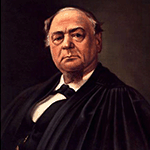
Noah Haynes Swayne (1862-1881)
Noah Swayne lived between 1804 and 1884. He was the first Republican appointment to the United States Supreme Court.
Early Life
Swayne was born in Frederick County, Virginia on December 7, 1804 and was the youngest of nine children. He attended Jacob Mendendhall’s Academy, a respected Quaker school, in Waterford. Swayne began studying medicine in Alexandria, but abandoned his studies after the death of his professor, Dr. George Thornton, in 1819. Although his family had no money to support his legal education, Swayne then began to read law under the guidance of John Scott and Francis Brooks in Warrenton. He was admitted to the Virginia Bar in 1823. A devout Quaker, Swayne was so deeply opposed to slavery that he left Virginia in 1824 to move to Ohio, an abolitionist state.
Legal Career
Swayne settled in Coshocton, Ohio and began serving on the state’s legislature. In 1830, President Andrew Jackson appointed Swayne United States Attorney for Ohio. Throughout his career, he held strong to his opposition to slavery. Swayne became an early member and political organizer of the Republican party, which was officially formed in 1855. Supreme Court Justice John McLean, a close friend of Swayne’s, recommended to President Abraham Lincoln that Swayne be appointed as his successor. McLean died soon after, but Swayne managed to rally sufficient support for his own appointment.
Appointment to the Supreme Court
President Lincoln appointed Swayne as an Associate Justice to the United States Supreme Court on January 24, 1862. Considered an undistinguished justice, Swayne’s potential judicial greatness failed to materialize. He wrote few major opinions and only served as an extra vote in important majority and dissenting positions lead by other justices. Although he lacked leadership on the bench, Swayne nonetheless coveted the position of Chief Justice. Swayne aggressively, albeit unsuccessfully, campaigned for the spot twice during his tenure. Despite his rapidly declining physical and mental health, Swayne insisted on remaining on the bench. Under pressure from President Rutherford B. Hayes, Swayne retired from the court in 1881, conditioning his retirement on the condition that his friend and fellow Ohio attorney Stanley Matthews replace him.
Death
Swayne died on June 8, 1884, and is buried at the Oak Hill Cemetery in Washington, D.C.
Notable Cases
Slaughterhouse Cases (1873)
Springer v. United States (1881)







